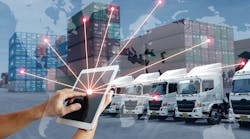How will fleet technologies evolve in 2021 and beyond? As Chief Technology Officer of a leading video telematics company, I have received this question a lot. Many of my fellow CTOs would be tempted to tick off a list of futuristic technologies. But I like to approach this from a completely different angle. To understand where technology is going, it’s helpful to dig into the catalysts driving markets today.
Fleets today have no shortage of catalysts. There’s no doubt the pandemic has set off an avalanche of challenges, including sudden, massive swings in demand for goods and services as consumer habits transformed overnight. Some shifts will prove temporary. Others may stick.
With change being the only constant, agility will be key. The market will place a priority on solutions that can help fleets rapidly assess change and quickly evolve their playbooks to meet new challenges. That’s the short answer.
My long answer, listed below in the form of 10 predictions for fleet technologies, attempts to go into more detail on these trends.
1. Operational silos will dissolve.
Silos, whether related to data or technologies, cause businesses to be slower and less efficient. The magic of data happens when you combine information across silos to uncover opportunities to be more productive, earn more revenue, or provide better service. Connecting those silos of information with unifying technologies will be critical to an organization’s ability to quickly see the picture, connect the dots, and make the necessary pivot. Fleets will look to all-in-one platforms that can unite functionalities into one dashboard, one bill, and one way to understand and manage what happens in their fleets.
2. Flexibility and agility will be critical.
As 2020 has taught us, business priorities can change on a dime. Knowing what’s happening within a fleet at a moment’s notice is important. But so is the ability to quickly take action. Organizations will need technologies to be flexible enough to keep up. That means technologies will evolve to let fleets rapidly reconfigure or scale as needed to respond to volatile market shifts.
3. Businesses will accelerate their adoption of artificial intelligence and machine vision
Managers can’t be everywhere at once. But technology will evolve in ways that give decision-makers greater visibility into more areas of their operations using artificial intelligence and machine vision. Combined, these technologies will provide an “easy button” for multiple aspects of fleet operations. This exists today, for example, with our distracted-driving algorithm, which can detect and deter smoking, eating, or cellphone use in real time. Optimizations for utilization, fuel, repairs, maintenance and more will become predictive and real-time, rather than static.
4. Video will be the new GPS.
From quality control and service verification to route optimization and real-time resource allocation, video is set to transform fleets in the same way it has already revolutionized driver safety and exoneration. Like GPS, video will add a rich layer of intelligence to fleet operations, giving managers new levels of understanding, allowing them to make better decisions faster.
5. Sensors will continue to proliferate.
The Internet of Things, or IOT, is poised to reshape fleets in profound ways. Sensors can be deployed for nearly anything that fleets need to learn more about, such as cargo temperature, humidity, pressure, location, and speed. This will vastly increase the amount of data generated – and put a premium on technologies that can fuse and leverage all that data to help managers take quick, decisive action.
6. Data dominance will help determine winning technologies.
What distinguishes useful algorithms that can save lives or predict the future is data. Producing reliable, useful algorithms requires vast datasets that capture as many of the scenarios that drivers encounter in real life as possible. That sort of precision calls for billions of miles of driving data across vehicle types, traffic scenarios, weather, population densities, and road conditions.
7. Better connectivity will improve everything.
Mobile connectivity has been a game changer, and continued improvements both in 4G and 5G will help us to push decision-making closer to the field using cloud-computing resources. When you decouple the decision-making from the hardware, fleets don’t have to keep upgrading hardware but can keep receiving new software innovations that improve performance.
8. Autonomous vehicle technologies will continue to shape the way we think about fleet management.
Soon, we will see the development of autonomous vehicle ecosystems. We’re already seeing inroads in this area, including TuSimple’s Autonomous Freight Network, an ecosystem of Level 4 autonomous trucks, digitally mapped routes, dedicated terminals, and a monitoring system to track it all. ABI Research projects that Level 4 class 8 tractor trailers will grow to 30% of new purchases by 2030. This growth will drive the flow of advances, further transforming how we approach fleet management.
9. Platforms will take center stage.
Emerging from 2020, the ability to assess change and adjust on a dime will be critical. To do this, organizations are increasingly integrating their fleet technologies to better understand the entirety of their operations. Platforms help to unite systems silos, providing businesses with visibility to more areas of their operations in less time.
10. Shared mobility will become a viable option for commercial fleets.
The concept of shared mobility has already upended passenger transit. It now has the potential to transform commercial delivery, providing flexible goods movement, dynamic supply chain management, as well as more efficient allocation of shared resources, such as cargo capacity. What makes shared mobility possible is the platform ecosystem I’d touched on earlier. Platforms are critical here because they let businesses easily tap into external resources and applications.
While some of these predictions may or may not come to pass, what’s clear is that technology for its own sake will not survive in 2021. The market dynamics borne from last year’s seismic shifts demand that technology be more than a checklist of features. The technologies that gain traction will be the ones that truly help fleets become more agile, resourceful, and adaptable.



